Israel’s Crimes Against Humanity at Sde Teiman—and the Complicity of Its Doctors
The conditions at the Israeli detention camp, abetted by its medical staff, violated both international law and medical ethics.
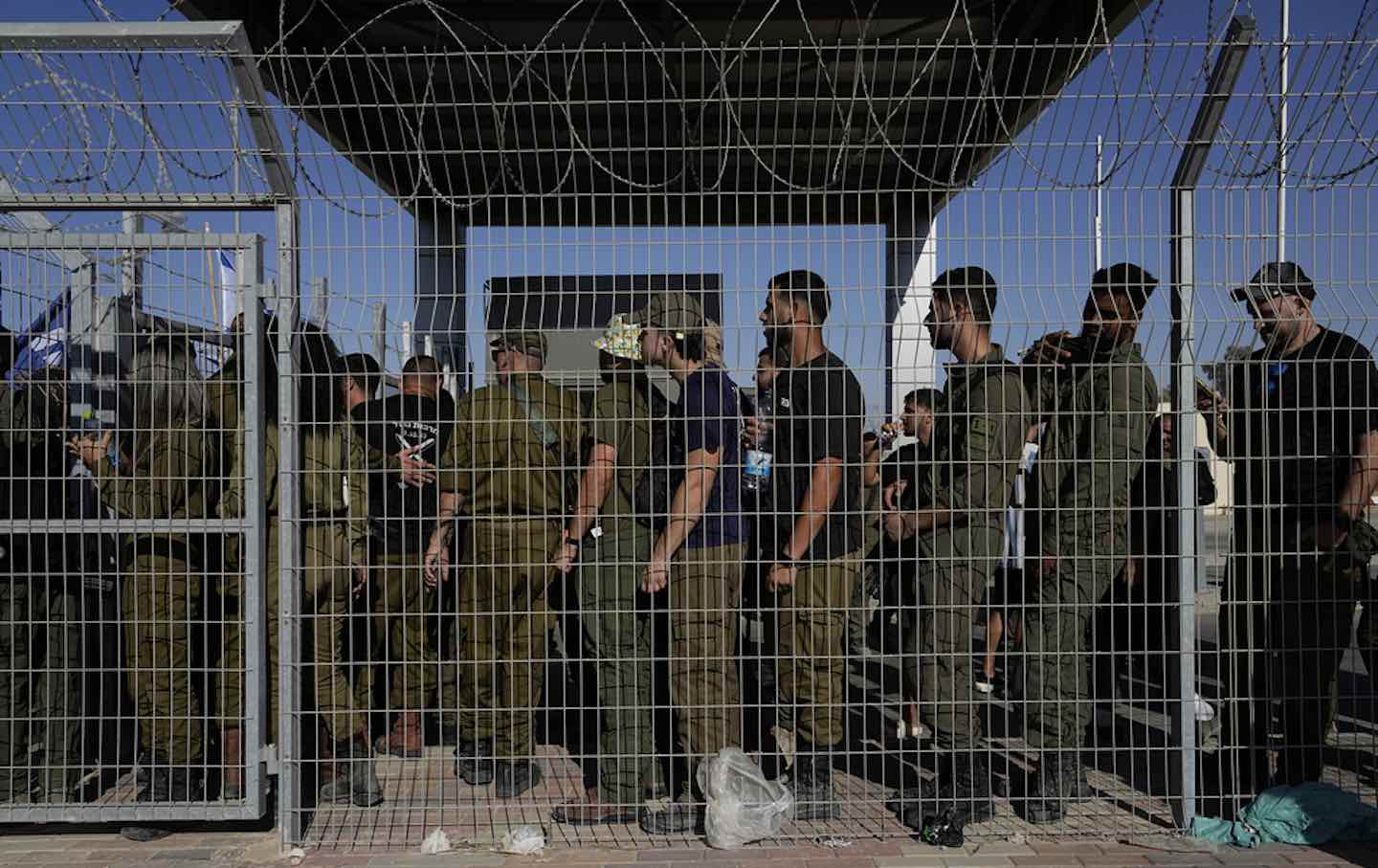
Israeli soldiers gather at the gate to the Sde Teiman military base, as people protest in support of soldiers being questioned for detainee abuse, on July 29, 2024.
(Tsafrir Abayov / AP Photo)
On Monday, a group of Israelis, including far-right lawmakers, swarmed the Sde Teiman detention camp in outrage. Their objection was not to the revelations that Israeli troops had brutally abused a Palestinian detainee at the camp but that those troops were being investigated for these crimes. The Palestinian detainee had suffered a “ruptured bowel, a severe injury to his anus, lung damage and broken ribs” at the hands of prison guards at Sde Teiman, according to Haaretz. “I couldn’t believe an Israeli prison guard could do such a thing,” the outlet quotes facility doctor Yoel Donchin as saying, though it is hard to take his surprise very seriously: numerous outlets have been carrying stories describing rampant abuse at Sde Teiman (and elsewhere) for months, including the deaths of 35 or more detainees. But by quoting a facility doctor, Haaretz brought a disturbing and underdiscussed side of Sde Teiman to the fore: the complicity, even participation, of Israeli medical professionals in crimes against humanity.
Sde Teiman is typically described as a military camp for Gaza detainees adjoined by a “field hospital” where doctors such as Yoel Donchin care for sick and injured detainees. Yet each was a part of an integrated complex with abuse built into its foundation. Following the attacks of October 7, the Israeli Knesset passed legislation “laying the legal groundwork for sites like Sde Teiman to operate with unprecedented impunity,” +972 reported, allowing Palestinians rounded up (often indiscriminately) in Gaza to be detained without warrant for 45 days and without seeing a lawyer for some six months, effectively disappearing them for lengths of time.
Meanwhile, purportedly because Israeli civilian hospitals often refused to treat injured Palestinians after October 7, the Ministry of Health set up the Sde Teiman field hospital to treat injured detainees. But as suggested in a harrowing report from Physicians for Human Rights Israel (PHRI) published in April, the protocols for medical care at the facility laid out by the ministry laid the groundwork for conditions “amounting to torture.”
The Sde Teiman field hospital was staffed not by doctors from the Military Corps, who are legally subject to Israel’s Patient Right Act, but by military reserve doctors, who are not, according to the PHRI report. More seriously, the Ministry of Health directives for the field hospital explicitly required that patients be blindfolded and shackled when treated. It also created an anomalous and dangerous system of anonymity for medical providers, with physicians instructed not to sign their patient notes in their own name—a universal medical norm that, as an ICU doctor, I would be shocked to be asked to violate. Allegedly this was to protect medical personnel, but in effect it provides cover against potential charges for violations of medical ethics.
And such violations, as Israeli doctors have made clear, were routine. In April, Haaretz reported on a letter sent by an Israeli physician whistleblower at the field hospital to the government describing nightmarish conditions. The whistleblower notes that, in accordance with Ministry of Health directives, each patient was handcuffed by all four limbs and blindfolded during treatment, as well as being fed through straws and forced to defecate into diapers. Predictably, the protracted use of handcuffing had not just psychological but physical consequences. “Just this week, two prisoners had their legs amputated due to handcuff injuries, which unfortunately is a routine event,” said the physician.
“This makes all of us—the medical teams and you, those in charge of us in the health and defense ministries—complicit in the violation of Israeli law,” he wrote, “and perhaps worse for me as a doctor, in the violation of my basic commitment to patients, wherever they are, as I swore when I graduated 20 years ago.”
International law and medical ethics strictly forbid the active participation or passive complicity of medical professionals in torture or “other cruel, inhuman or degrading treatment or punishment.” Norms set forth by the World Medical Assembly, founded in the wake of the atrocities of World War II, similarly obligate physicians like myself to document and denounce torture when we treat its victims, because not doing so “may be considered as a form of tolerance thereof.” But the issue is not merely that most doctors failed to report torture at Sde Teiman while providing care: The conditions in the medical facility themselves appear tantamount to torture, and, unquestionably, of cruel and degrading treatment.
One whistleblower told CNN he performed medical procedures that he was not qualified to do. “I was asked to learn how to do things on the patients, performing minor medical procedures that are totally outside my expertise,” often without anesthesia, he said, adding, “Just being there felt like being complicit in abuse.” He also told CNN that he saw a man undergo an amputation due to protracted use of zip-ties around his wrists, consistent with the letter to Haaretz. A medic whistleblower described to CNN what it must have felt like for patients in the field hospital: “If you imagine yourself being unable to move, being unable to see what’s going on, and being completely naked, that leaves you completely exposed. I think that’s something that borders on, if not crosses to, psychological torture.” Another physician told the BBC that he felt that conditions in the medical facility were tantamount to “torture,” and at least one detainee reported, according to the British Medical Journal, that a doctor and nurse participated in beatings. The PHRI report noted that medical treatment was typically provided without translation or informed consent—and that the Israel Medical Society basically waved away reports of such ethical violations.
Just as troubling, as the PHRI report describes, is the fact that physicians must have been aware of the severe and sadistic violence inflicted on detainees in the camp by prison guards. “Given that detainees consistently arrive for medical care with signs of severe violence, and considering that the cries of those enduring torture and violent punishment are clearly audible at the field hospital’s tent, located at a distance of single meters from the detention pens, it is reasonable to infer that the medical staff is fully aware of the activities taking place in the detention facility,” it notes. These tortures included beatings with rifle butts and batons, electric shocks, and rape with sticks that inflicted grievous injuries, according to The New York Times.
Those medical professionals appear to have been closely involved in the day-to-day operation of the camp. The Times reported that medics “screened every detainee on arrival, in addition to monitoring them every day in the hangars,” with “serious cases” treated in what it describes as a “nearby cluster of tents that form a makeshift field hospital.” These are important details: They suggest an integrated medico-carceral operation, such that the involvement of medical professionals may have enabled abuse at the camp by providing a veneer of medical safety and purpose. Incredibly, the physician Yoel Donchin admitted as much to Haaretz: If the government were to “maintain a hospital only for the sake of defending ourselves at the Hague,” he said, “that’s no good.”
The participation or complicity of those in my profession in crimes against humanity is, of course, nothing new—most infamously in Germany during World War II, but also in many places since, ranging from Pinochet’s Chile to the US after 9/11, when psychologists designed torture protocols for detainees. Further investigation is urgently needed, but what we already know as of today is devastating for the Israeli medical profession.
Physicians ran a facility at Sde Teiman where detainees were kept blindfolded and restrained by all extremities. Basic medical norms were violated, including the right to informed consent and adequate food. Those physicians appear to have examined patients before and after they were abused by prison guards in the camp, and they must have heard cries of anguish in the complex as detainees were subject to sadistic tortures.
Yet very few, it seems, took a stand against this grotesque system.
Support independent journalism that exposes oligarchs and profiteers
Donald Trump’s cruel and chaotic second term is just getting started. In his first month back in office, Trump and his lackey Elon Musk (or is it the other way around?) have proven that nothing is safe from sacrifice at the altar of unchecked power and riches.
Only robust independent journalism can cut through the noise and offer clear-eyed reporting and analysis based on principle and conscience. That’s what The Nation has done for 160 years and that’s what we’re doing now.
Our independent journalism doesn’t allow injustice to go unnoticed or unchallenged—nor will we abandon hope for a better world. Our writers, editors, and fact-checkers are working relentlessly to keep you informed and empowered when so much of the media fails to do so out of credulity, fear, or fealty.
The Nation has seen unprecedented times before. We draw strength and guidance from our history of principled progressive journalism in times of crisis, and we are committed to continuing this legacy today.
We’re aiming to raise $25,000 during our Spring Fundraising Campaign to ensure that we have the resources to expose the oligarchs and profiteers attempting to loot our republic. Stand for bold independent journalism and donate to support The Nation today.
Onward,
Katrina vanden Heuvel
Editorial Director and Publisher, The Nation
More from The Nation
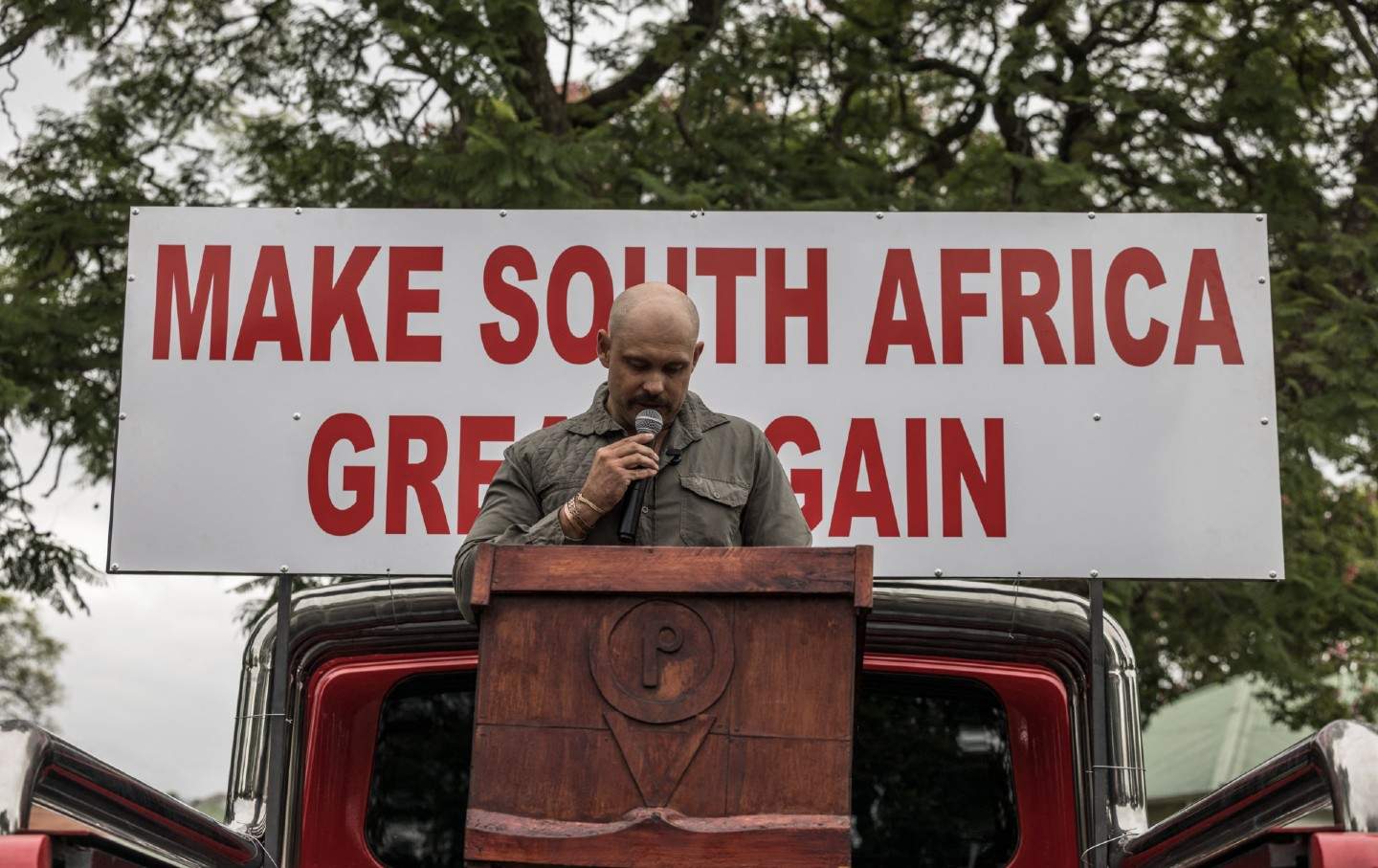
Why Trump Is Right to View South Africa as a Threat Why Trump Is Right to View South Africa as a Threat
The country’s Constitution gives its citizens more than a right to the pursuit of happiness. But attempts to redeem that commitment to justice have enraged American reactionaries....
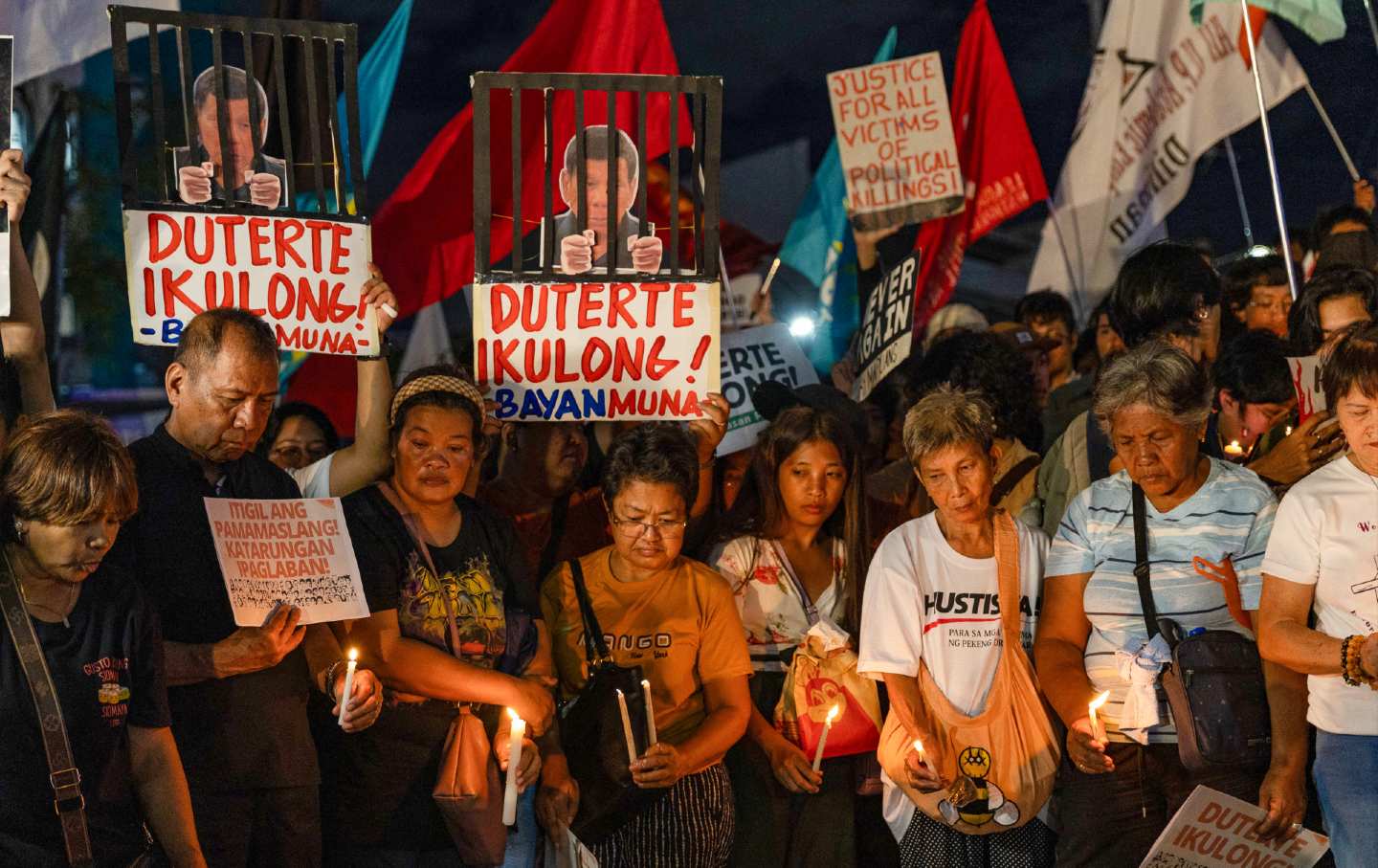
Rodrigo Duterte Used the Philippines’ US-Made Constitution Against Itself Rodrigo Duterte Used the Philippines’ US-Made Constitution Against Itself
The autocratic spectacle of Duterte’s presidency should be a warning to the United States.

Going for Green: Uruguay’s Renewable Energy Revolution Going for Green: Uruguay’s Renewable Energy Revolution
With no fossil fuel reserves to rely on and domestic demand rising, the country had to get creative—or go broke just trying to keep the lights on. Here’s how they did it.
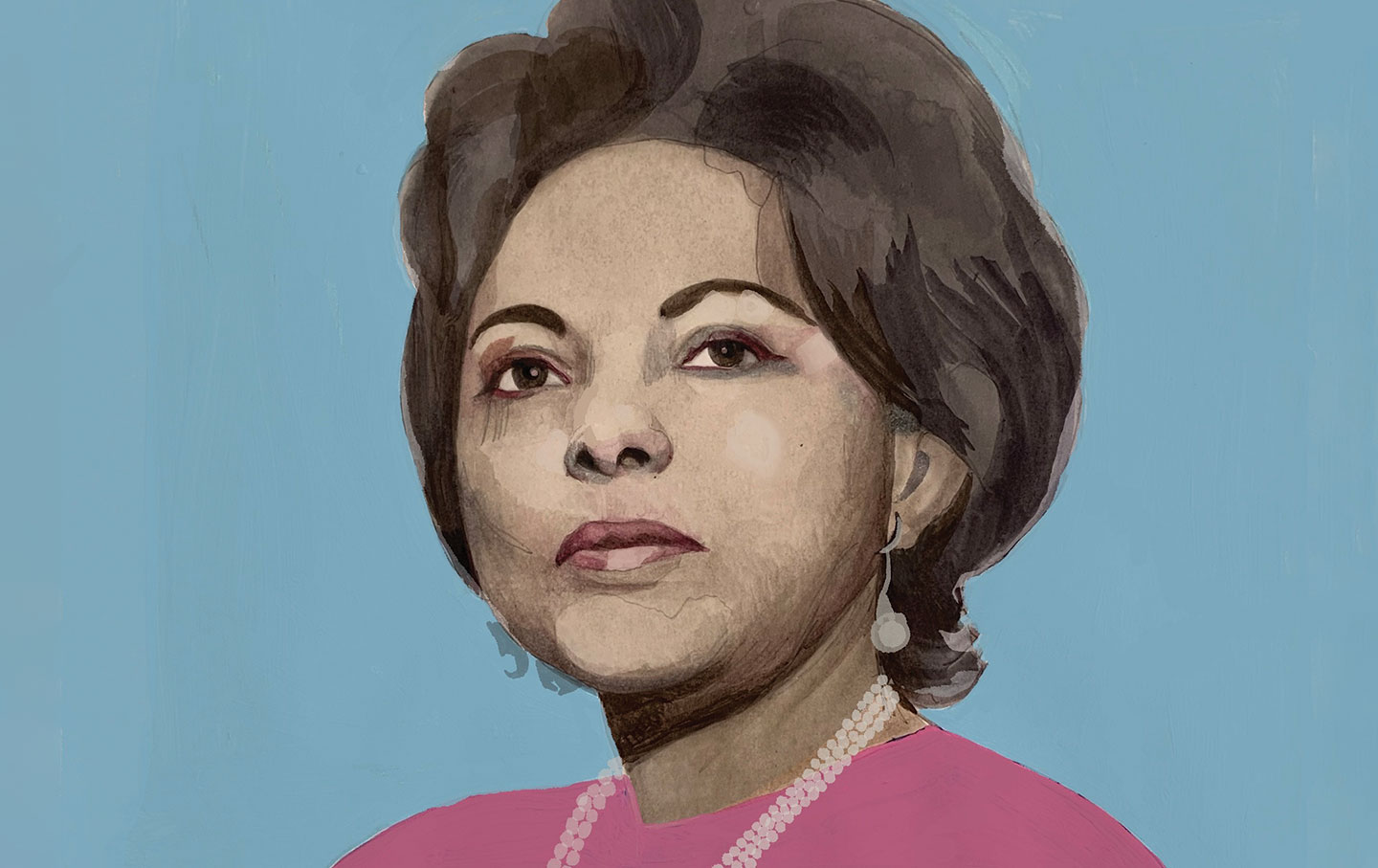
Andrée Blouin’s Revolutionary Lives Andrée Blouin’s Revolutionary Lives
The African political leader’s autobiography, My Country, Africa, also offers a larger story of empire, oppression, and resistance on the continent.
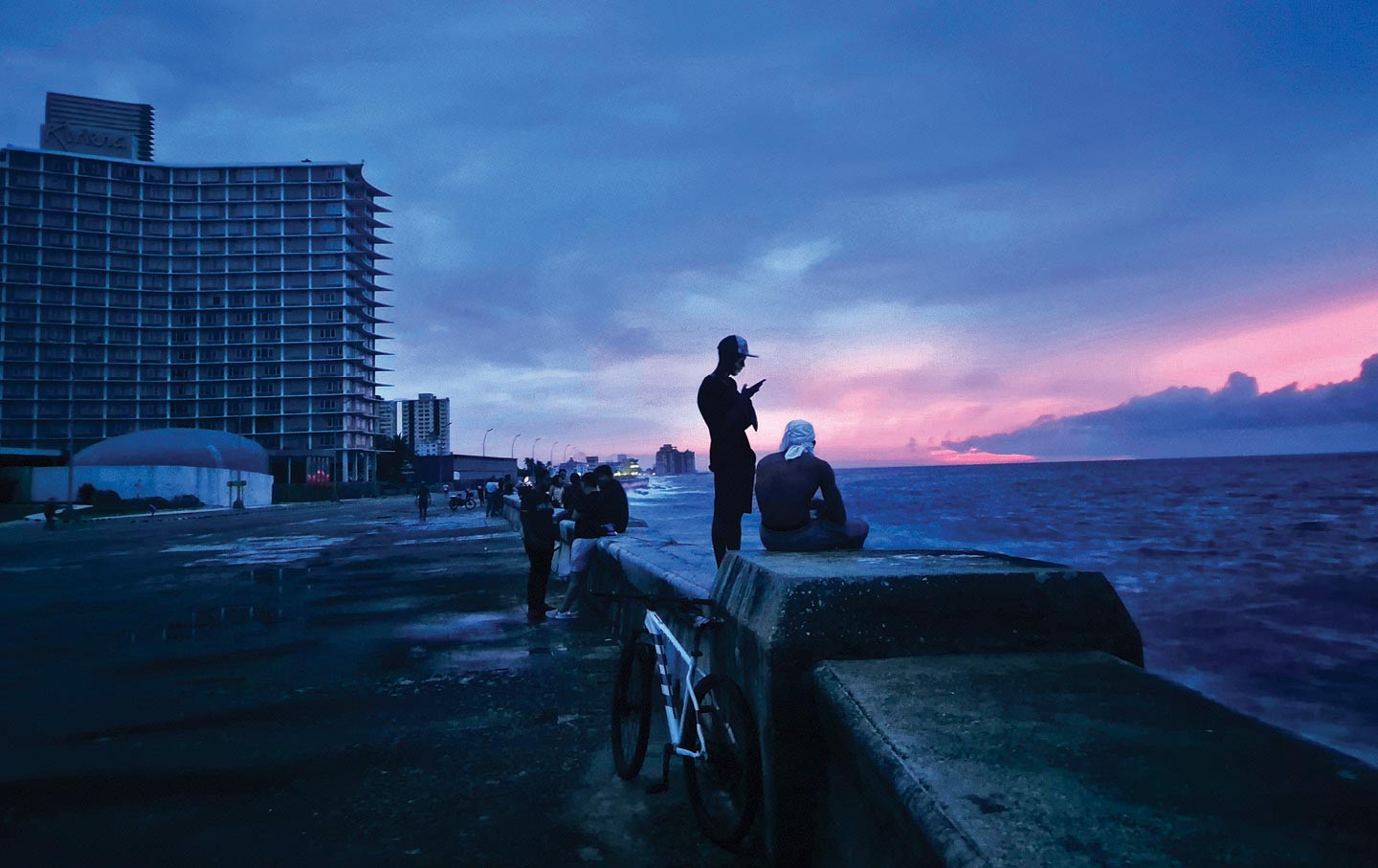
Life in Cuba Under Sanctions Life in Cuba Under Sanctions
Ordinary Cubans are trapped in a vicious circle of government mismanagement exacerbated by the US embargo.
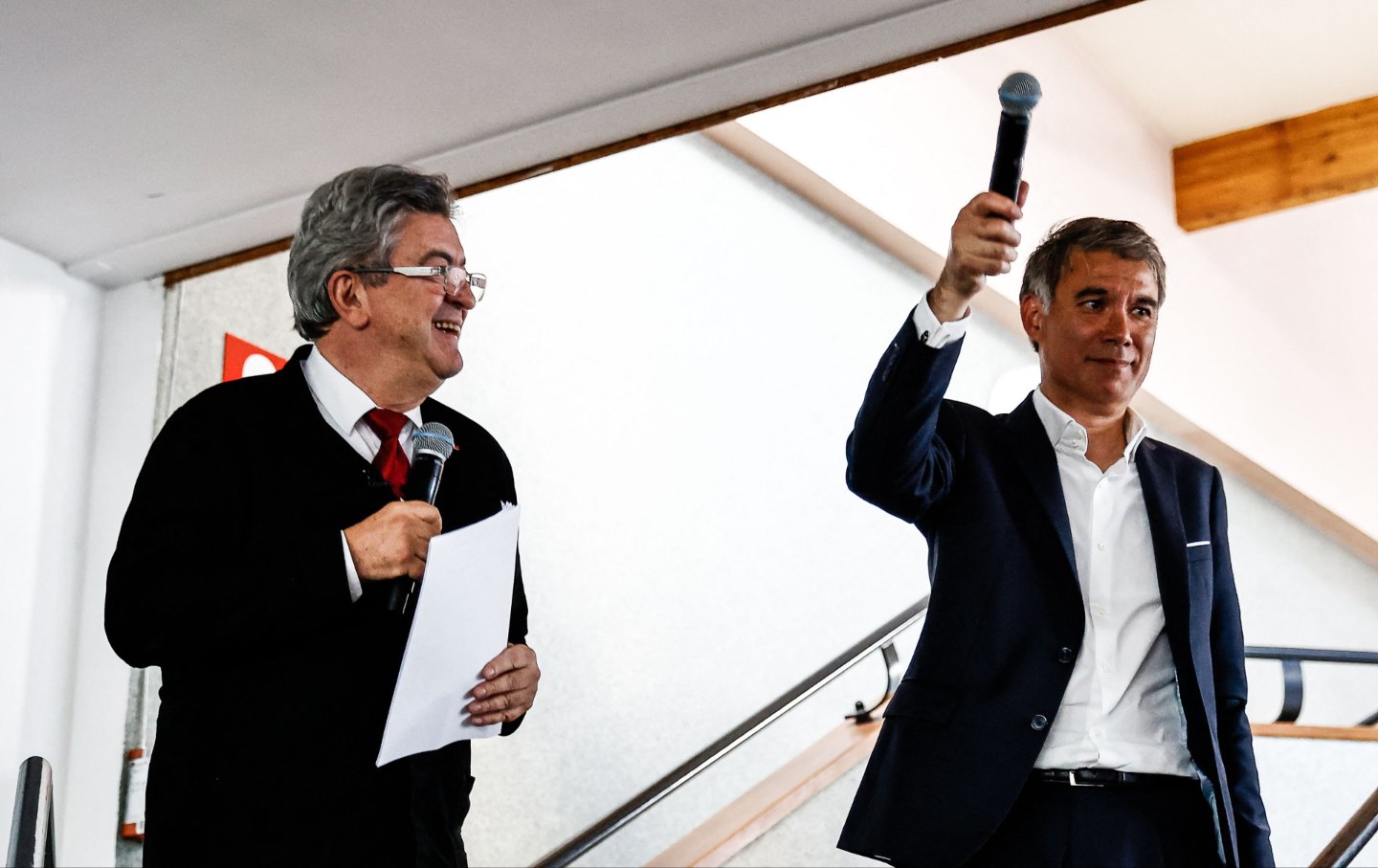
The Crisis Engulfing the French Left The Crisis Engulfing the French Left
The New Popular Front alliance looked like the best hope the left had against Macron and Le Pen. But after months of internal conflicts, it’s on the brink of collapse.


